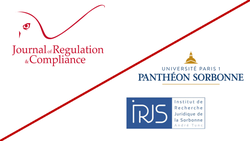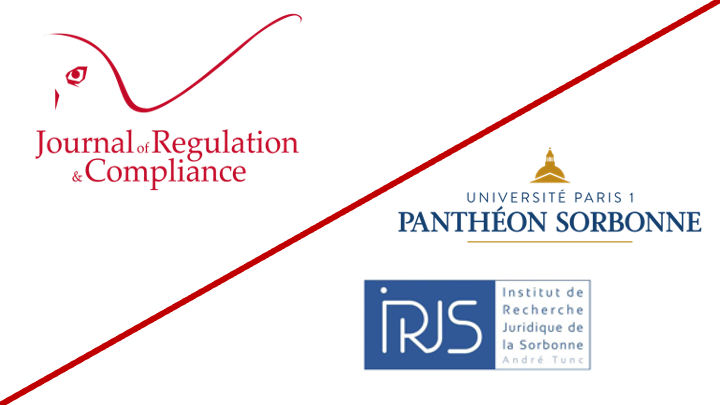
⚙️Co-organisation of the symposium 🧮Durabilité de l’Internet : le rôle des opérateurs du système des noms de domaine. Compliance et Régulation de l’espace numérique (Sustainability of the Internet: the role of the operators of the domain name system. Compliance and regulation of the digital space)
pour lire cette présentation en français ↗️ cliquer sur le drapeau français

🌐follow Marie-Anne Frison-Roche on LinkedIn
🌐subscribe to the Newsletter MAFR. Regulation, Compliance, Law
🌐subscribe to the Newsletter Surplomb, par MAFR
____
► Full Reference: M.-A. Frison-Roche & G. Loiseau (dir.), Durabilité de l'Internet : le rôle des opérateurs du système des noms de domaine. Compliance et régulation de l'espace numérique (Sustainability of the Internet: the role of the operators of the domain name system. Compliance and regulation of the digital space), Journal of Regulation & Compliance (JoRC) and Institut de Recherche Juridique de la Sorbonne (André Tunc - IRJS), Paris 1 Panthéon-Sorbonne University, 21 Fabruary 2025
____
► General presentation of this symposium: The digital space has been built on and as a system. Its primary interest is of a negative nature: it consists of to be preserved against the prospect of systemic failure, of not collapsing. Like all other systems, this 'Monumental Goal' specific to the digital system justifies resources that incorporate this concern for the future. As with all systems, it integrates and relies on the specific technical nature of this system.
The digital space is largely based on the invention, technology and architecture of domain names. Domain names, as an addressing system, enable users to enter the digital space and find other Internet users. The uniqueness and solidity of the domain name system, entrusted to a single root and decentralisation, makes this community possible for those who use the digital space and ensures the technical durability required, without which the digital space would be compromised.
The architecture, operation, operators and what they do under the control of legislators, regulators, judges and legal subjects are therefore examined from a dual technical and legal perspective, in the light of the imperative of sustainability.
This allows to progress in 4 stages.
Firstly, to examine the permanence in time and space of the domain name system, insofar as it is the foundation of the Internet and the digital system. This technical construction gives rise to legal qualifications, not only for the present but also for the future, since the Web3 offers new technical solutions.
Secondly, this technical sustainability is an imperative that is built into the operators of the domain names themselves, which are inter-linked not only at national level but also at global level, this cross-linking being necessary for the security of the system. The State is present through public law techniques that enable surveillance, control and possible recovery.
Thirdly, it imposes constraints on the operators subject to them in order to serve this monumental goal of technical sustainability, and these constraints themselves generate as many powers as they need to usefully achieve this mission. This proportionality must be at the heart of the method and the requirements. The relationship between constraints and powers also stems from it.
Fourthly, this imperative of technical sustainability, which is global in nature, gives way to imperatives of societal sustainability, more localised in space and time, when domain name operators are called upon by the legitimate authors of binding standards, legislators in the first instance, to express concerns such as the protection of people involved in the digital space and whose rights are compromised or who are in danger.
This second type of sustainability, which is more localised and less inherent in the architecture of the Internet, is justified by the available power of the operators concerned and their adherence to social imperatives. The resulting constraints and powers are therefore not the same.
The 2 sustainabilities must then be articulated in a conception that is both teleological and pragmatic.
____

____
► Speakers (they will speak in French, but the book to be published will be in English):
🎤Pierre Bonis, Chief Executive Officer of the Association française pour le nommage Internet en coopération (Afnic)
🎤Lucien Castex, Adviser of the Afnic Chief Executive Officer for Research internet and society and Internet governance
🎤Marie-Anne Frison-Roche, Full Professor of Regulatory and Compliance Law, Director of the Journal of Regulation & Compliance (JoRC)
🎤Claire Leveneur, Senior Lecturer at Paris-Est Créteil University
🎤Grégoire Loiseau, Full Professor at Paris 1 Panthéon-Sorbonne University
🎤Samir Merabet, Full Professor at the University of West Indies
🎤Antoine Oumedjkane, Senior Lecturer at Lille University
🎤Frédéric Sardain, attorney at law, Jeantet law firm
____
read below a detailed presentation of this event⤵️
Durabilité de l'Internet :
le rôle des opérateurs
du système des noms de domaine.
Compliance et régulation
de l'espace numérique
(Internet Sustainability:
the Role of the Operators
of the Domain Name System.
Compliance and Regulation of the Digital Space)
under the scientific supervision of
Marie-Anne Frison-Roche and Grégoire Loiseau
Friday 21 February 2025, Paris
Paris 1 Panthéon-Sorbonne University
Salle 6, 12 place du Panthéon, 75005 Paris
9am.-9.05am. Mot d’accueil (Welcome adress), by Grégoire Loiseau, Full Professor at Paris 1 Panthéon-Sorbonne University
9.05am.-9.20am. Introduction générale. Articulation de la durabilité technique et de la durabilité sociétale de l’espace numérique par le système des noms de domaine (General introduction. Articulating the technical and societal sustainability of the digital space through the domain name system), by Pierre Bonis, Chief Executive Officer of the Afnic
I. LA PERMANENCE DANS LE TEMPS ET DANS L’ESPACE DU SYSTÈME DES NOMS DE DOMAINE, SOCLE DE L’INTERNET ET DU SYSTÈME NUMÉRIQUE : LES QUALIFICATIONS QUI EN DÉCOULENT
(I. THE PERMANENCE IN TIME AND SPACE OF THE DOMAIN NAME SYSTEM, WHICH IS THE FOUNDATION OF THE INTERNET AND THE DIGITAL SYSTEM: THE RESULTING QUALIFICATIONS)
9.20am.-9.40am. L’architecture technique du système des noms de domaine, socle historique et constant de l’Internet (The technical architecture of the domain name system, the historic and constant foundation of the Internet), by Pierre Bonis, Chief Executive Officer of the Afnic
9.40am.-10am. L’impact juridique possible des innovations techniques du web sur le système des noms de domaine et le principe de durabilité (The possible legal impact of technical web innovations on the domain name system and the principle of sustainability), by Claire Leveneur, Senior Lecturer at Paris-Est Créteil University
10am.-10.20am. La qualification du système de noms de domaine comme infrastructure et ses conséquences juridiques (Classification of the domain name system as an infrastructure and its legal consequences), by Marie-Anne Frison-Roche, Full Professor of Regulatory and Compliance Law, Director of the Journal of Regulation & Compliance (JoRC)
10.20am.-10.30am. Debate
II. LES IMPÉRATIFS DE LA DURABILITÉ TECHNIQUE, INTEGRÉS DANS LES OPÉRATEURS DU SYSTÈME DES NOMS DE DOMAINE
(THE IMPERATIVES OF TECHNICAL SUSTAINABILITY, INTEGRATED INTO THE OPERATORS OF THE DOMAIN NAME SYSTEM)
10.30am.-10.50am. Place et rôle des offices pour assurer la durabilité technique de l’Internet (Place and role of government agencies in ensuring the technical sustainability of the Internet), by Lucien Castex, Adviser of the Afnic Chief Executive Officer for Research internet and society and Internet governance
10.50am.-11.10am. Les rapports nationaux et internationaux et mondiaux entre opérateurs pour assurer la durabilité technique de l’Internet (National, international and global relations between operators to ensure the technical sustainability of the Internet), by Samir Merabet, Full Professor at the University of West Indies
11.10am.-11.30am. La clé de la proportionnalité pour établir l’équilibre des obligations, pouvoirs et droits - Exemple de l’inclusion technique assurée par les opérateurs des noms de domaine (The key to proportionality in balancing obligations, powers and rights - Example of technical inclusion by domain name operators)), by Marie-Anne Frison-Roche, Full Professor of Regulatory and Compliance Law, Director of the Journal of Regulation & Compliance (JoRC)
11.30am.-11.40am. Debate
III. LA DURABILITÉ SOCIÉTALE, UNE DURABILITÉ POLITIQUE RELATIVE DANS L’ESPACE ET DANS LE TEMPS
(III. SOCIETAL SUSTAINABILITY, A POLITICAL SUSTAINABILITY RELATIVE TO SPACE AND TIME)
11.40am.-12pm. L’extension de l’obligation des opérateurs des noms de domaines relatives à la protection des personnes (Extending the obligations of domain name operators with regard to the protection of individuals), by Frédéric Sardain, attorney at law, Jeantet law firm
12.pm.-12.20pm. L’injonction en suppression du nom de domaine pour non-contrôle de l’âge de l’internaute (Injunction to delete a domain name for failure to check the age of an Internet user), upcoming speaker
12.20pm-12.40pm. Les responsabilités (Liabilities), by Grégoire Loiseau, Full Professor at Paris 1 Panthéon-Sorbonne University
12.40pm.-12.50pm. Debate
12.50pm.-1.10pm. Conclusion. Régulation, Compliance et Gouvernance : un équilibre à expliciter pour accroître la solidité de l’espace numérique (Regulation, Compliance and Governance: a balance that needs to be clarified to make the digital environment more robust), by Marie-Anne Frison-Roche, Full Professor of Regulatory and Compliance Law, Director of the Journal of Regulation & Compliance (JoRC)
________

comments are disabled for this article